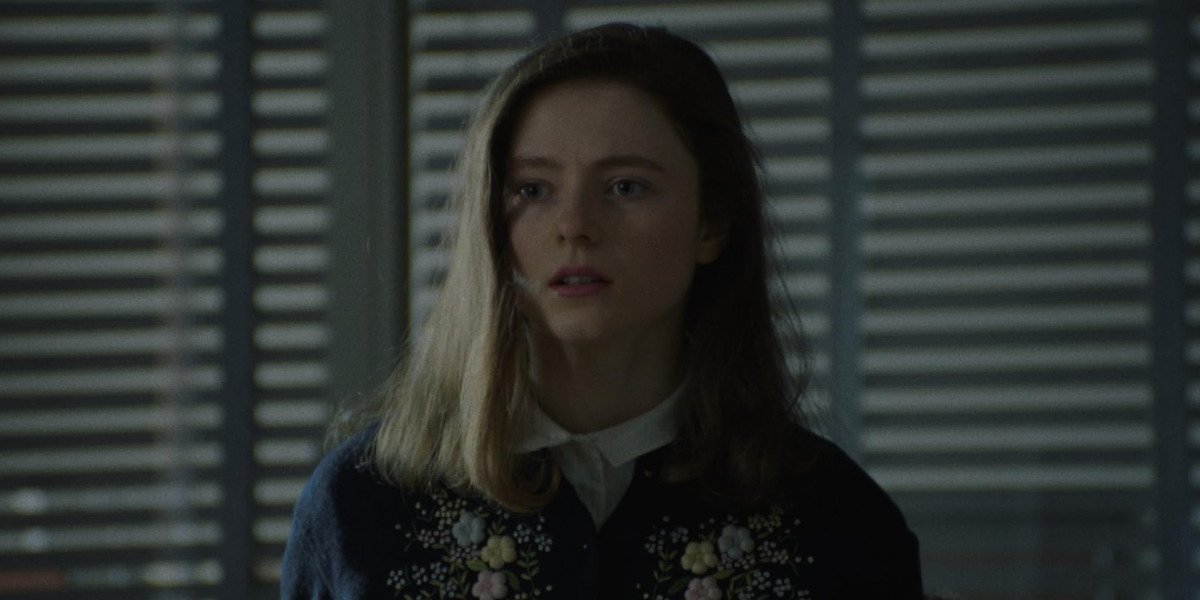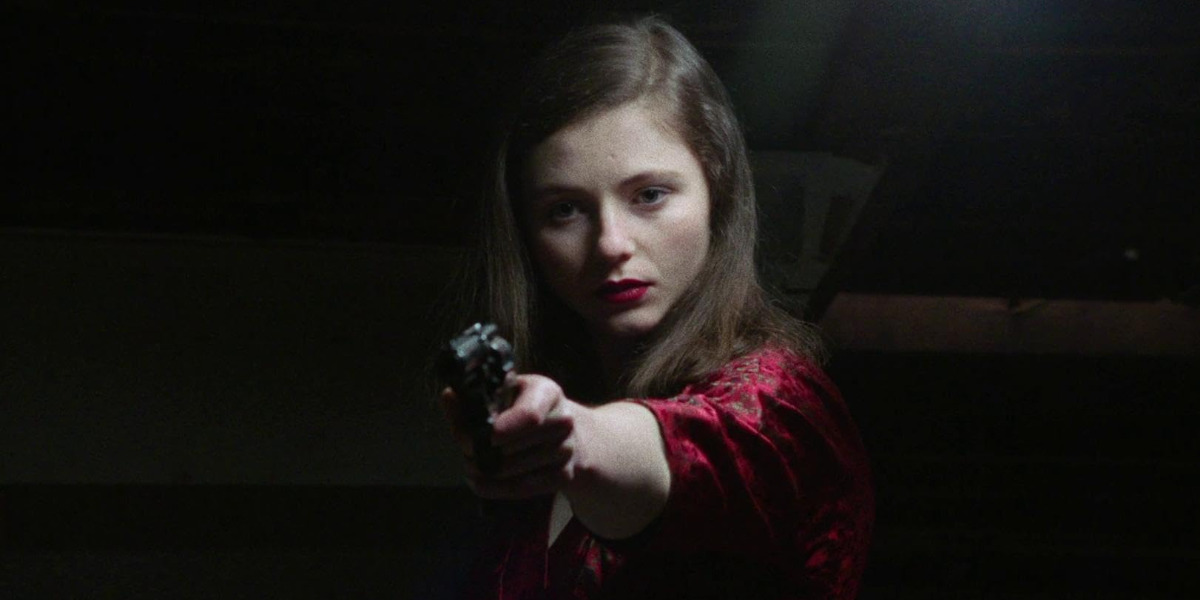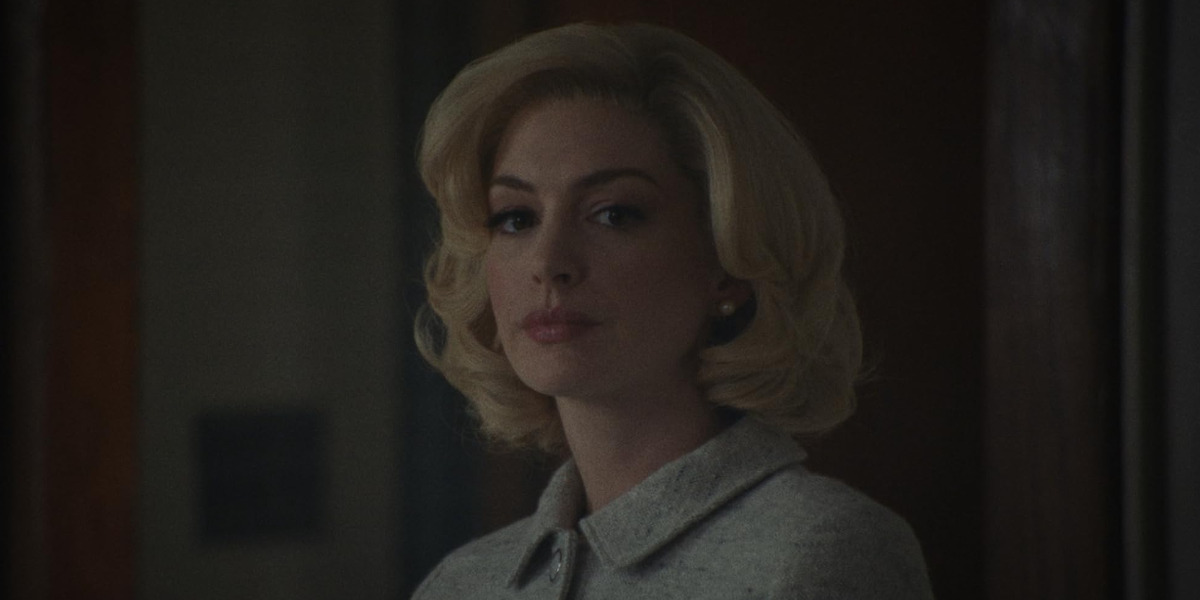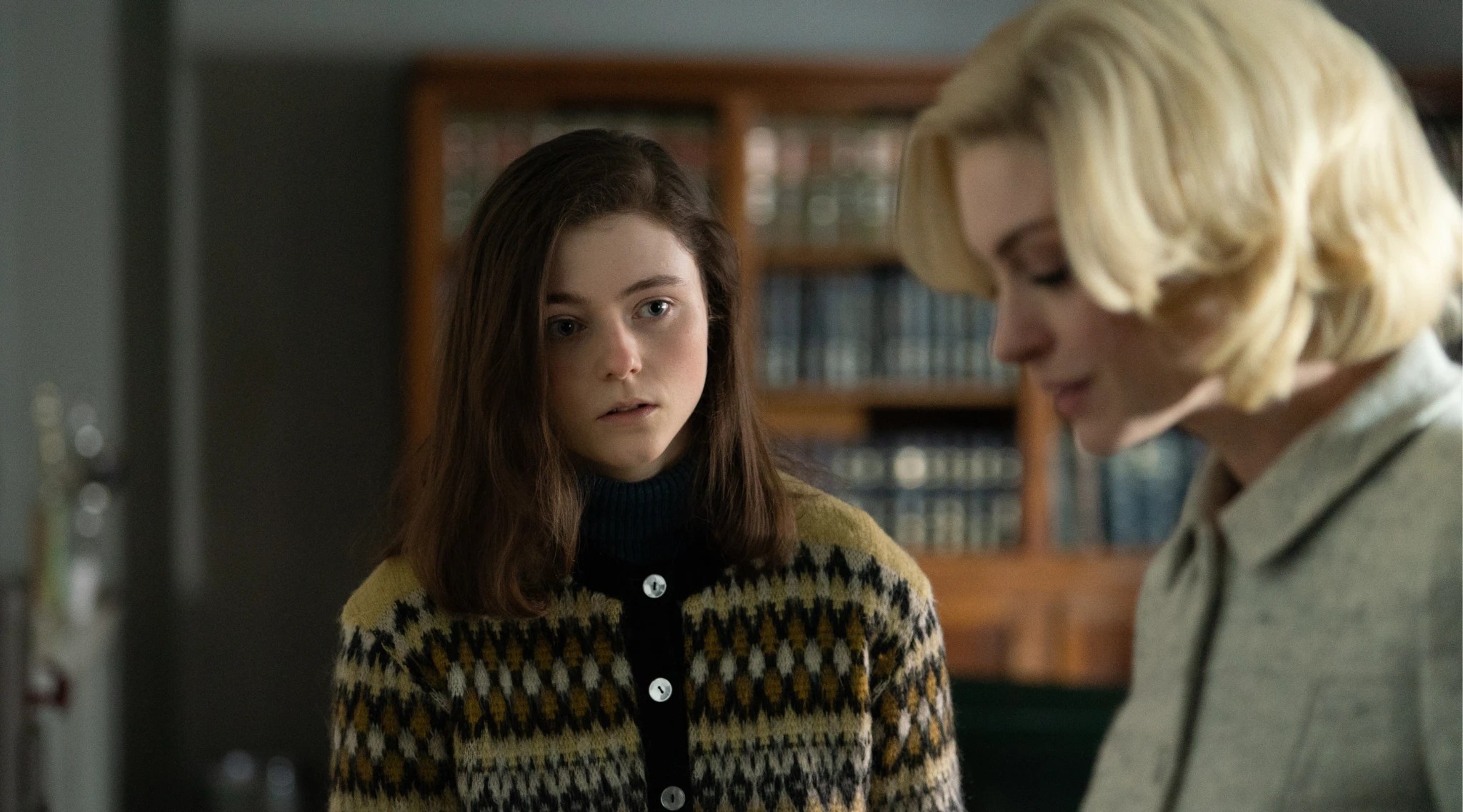William Oldroyd’s period-drama film, ‘Eileen,’ presents a charming tale about a troubled woman whose narrative turns into a psychological thriller after her paths cross with an enigmatic woman. The titular protagonist is a young woman in her 20s who lives with her father— a drunken ex-cop— and works at a juvenile detention center, watching her monotonous life unfold. However, the monotony in her life takes a backseat once a beautiful and intelligent woman, Rebecca, joins the center as the prison psychologist. After the two women strike up a friendship built on Rebecca’s curiosity and Eileen’s infatuation, it leads the duo down untrodden paths.
The story features an unpredictable plot twist that flips the narrative on its axis, changing the course of Eileen and Rebecca’s lives. For the same reason, the film’s end is bound to leave the viewers with a few questions. SPOILERS AHEAD!
Eileen Plot Synopsis
In the 1960s, in Boston, Eileen Dunlop lives a somber life, where her imagination—and the occasional voyeuristic spying on couples—are her only forms of escape. Her job at the juvenile center is equally as lackluster as her personal life, which she shares with her borderline-alcoholic father, who tends to swing his gun around and trouble the neighbors. Despite only having Eileen to look after his deteriorating health, Jim Dunlop remains sour towards his youngest daughter, constantly taking jabs at her.

Therefore, Eileen’s life is tee-ed up to take a sharp turn when Dr. Rebecca Saint John, a Harvard-trained psychologist, joins the girl’s workplace as the prison psychologist. Rebecca notices Eileen on her first day at the job, leading the two women to get acquainted. From the get-go, Eileen becomes enamored by Rebecca’s beauty, brains, and brawns. Consequently, the younger woman easily mounts the psychologist on a pedestal, reveling in catching the latter’s attention.
Nevertheless, Eileen’s pleasant mood is reserved for the detention center, as Jim’s insulting remarks await her at home. After the former cop mentions an inmate, Lee Polk, a young boy who killed his father, it piques the woman’s curiosity, compelling her to seek out his official file. Soon after, she learns that Rebecca has also taken an interest in Polk as she engages in conversations with him at the detention center. However, the one time Rebecca attempts to facilitate some sort of meeting between Lee and his mother, Anne— it ends in a disaster, with the latter storming out of the center.
While the same catches Eileen’s attention, she becomes more preoccupied once Rebecca asks her to hang out with her at the local bar, O’Hara. After putting extensive thought behind her appearance— from her clothes to her makeup and hair— Eileen spends an enjoyable night drinking and dancing with Rebecca. When it comes time for the blonde woman to leave, she bids Eileen goodbye with a tipsy kiss. Beguiled by their time together, Eileen decides to stick around, ordering Rebecca’s drink order and earning herself a nasty hangover for the following day.
The next morning, Eileen finds herself passed out in her own sick inside her car with a very pissed-off Jim waiting for her inside the house. Although her father attempts to order her around, Eileen ignores his unkindness and runs to the office to catch another glimpse of Rebecca. However, once at the center, she realizes that Rebecca seems to have left for the holiday break. Consequently, her spirit dims, leading her to take sick leave. Worse yet, an unpleasant surprise awaits her at home when she returns to find her father in distress. A trip to the hospital reveals that Jim’s health is steadily deteriorating, leaving little room for recovery.
Without Rebecca, Eileen returns to her dull life, highlighted by her father’s cruel remarks, until the blonde woman finally reaches out to her again. Rebecca invites Eileen over to celebrate Christmas at her house— an invitation the younger woman gleefully accepts. Armed with wine as a gift, Eileen drives to Rebecca’s house with her nerves on the spritz.
At the house, Eileen finds a slightly frazzled Rebecca who talks about her unconventional life choices and Eileen’s spark of something special while serving up a thrown-together meal. Eventually, the conversation drifts toward Lee Polk and his case, wherein Rebecca reveals her extensive interest in understanding the boy. As the revelations of Lee’s murderous motives arrive, Rebecca finally reveals to Eileen that the reason she called her here that night is because she has Lee’s mother, Anne Polk, tied up in the house’s basement.
Eileen Ending: Why Did Lee Polk Kill His Father? Why Did Eileen Kill Mrs. Anne Polk?
Rebecca’s Christmas night revelation instantly flips a switch in the narrative, allowing the storyline to deliver on the built-up suspense. Lee Polk is one of the inmates at the detention center who has been a subject of both Eileen’s and Rebecca’s interest. However, the psychologist is much more involved with the man’s case due to her profession. Lee was imprisoned as a teenager after he stabbed his father to death. While most people remain horrified at his actions, Rebecca was intrigued by them— wondering what would compel an individual to commit such brazen patricide.

As such, Rebecca decides to ask Lee— point blank— about his motives and learns an ugly truth. Lee’s father used to sexually abuse the boy for years, which led the former to snap one night and brutally murder him. As it would turn out, since the murder was easily traceable to him— committed in front of his mother at their home— no one bothered to ask Lee about his motives. Therefore, he has been rotting away at the detention center. For the same reasons, Rebecca called his mother, Anne, into the center to coax out a confession from her that might help Lee’s case.
Consequently, Rebecca ends up at the Polk house after Anne refuses to comply in an effort to talk to the woman. Nevertheless, as per Rebecca, the meeting rapidly turned hostile, resulting in Anne getting tied up in the basement. Thus, the psychologist decided to call Eileen to help her deal with the mess of the situation. Although Eileen is initially betrayed by the confession, realizing Rebecca had ulterior motives, she deflates once the other woman reinforces their close friendship.
Therefore, Eileen agrees to help Rebecca in coaxing out a confession from Anne about what truly happened to Lee Polk. By doing so, the duo would be able to clear Rebecca’s name as a woman who attempted to kidnap Anne. As luck would have it, Eileen recently came into possession of her father’s gun after one of his manic episodes compelled the local police to force the weapon under Eileen’s supervision. As such, the two women use the gun to get Anne talking.
In turn, Anne spills out the entire truth about her husband’s sexually abusive activities toward their son. The woman hadn’t initially suspected her husband’s actions, figuring he only checked up on Lee at night due to his fatherly duties. Nevertheless, she eventually became privy to her son’s gross mistreatment after realizing her husband had contracted and passed STDs to both herself and her son. Nonetheless, she enjoyed the attention her husband gave to her on the nights after he would abuse their son. Therefore, she ended up keeping his secret.
Though framed as a cry for sympathy, the confession remains as revolting as it sounds. Thus, it sparks an almost instinctual action in Eileen, who fires the gun pointed at Anne and kills her on the spot. From an earlier interaction between Eileen and her sick father— wherein he clutches at her upper thigh and calls her by her older sister, Joanie’s name— one can speculate that Jim was an abusive father as well, at least to Joanie. Therefore, it is most likely that Eileen’s murderous reaction to Anne’s story stems from a deep-held resentment toward her own father.
Was Rebecca Imaginary?
Although Rebecca calls Eileen to help tone down the Anne Polk situation, the younger woman worsens the ordeal with her presence by killing the other woman. Consequently, Rebecca is deeply troubled by the turn of events and is at a loss for their next moves. Nevertheless, Eileen comes up with a contingency plan surprisingly quickly. Since Eileen’s father is known for his episodes wherein he threatens passers-by with his gun, Eileen suggests they deposit Anne’s body at her house to let her father take the blame for it. Meanwhile, she proposes the two women run away to New York together and start their lives anew.

For a moment, Eileen’s quick thinking and confession of love seem to sway Rebecca. Nevertheless, Rebecca proposes she stay behind to get rid of the evidence before following Eileen to her house. As a result, the younger woman ends up driving the dead body to her home alone, where she waits for Rebecca to arrive. Yet, despite the stretch of time spent by the window, Rebecca never shows up. Eventually, Eileen realizes that the other woman never will.
While one can read this instance as Rebecca’s betrayal, interpreting her absence as a decision against running away with Eileen, it also paves the way for the theory that Rebecca was never a real person to begin with. Throughout the film, Eileen consistently indulges in numerous imagined scenarios in her head— be it a sexual encounter with an attractive guard, her father’s murder, or her own suicide. Nevertheless, none of these instances ever actually come to fruition outside Eileen’s head, reinforcing their imaginary nature.
Similarly, the argument persists that Eileen imagined her entire relationship with Rebecca as a way to escape and deal with her own tumultuous life. Once the whole narrative comes under scrutiny with this perspective, a few things fall into place. For instance, Eileen’s interest in Lee Polk’s case is established before Rebecca’s introduction into the storyline. As such, the latter’s immediate and scrutinizing attention to Lee can be an extension of Eileen’s own interest in the case since it mirrored her own family life.
Furthermore, throughout the film, the viewers witness Eileen model her own personality after Rebecca— from copying her martinis to her bold disposition. Consequently, it remains possible that the timid, shy Eileen dreamt up an ideal woman to boost her own confidence. The same remains reminiscent of the numerous near-perfect attributes that Rebecca carries. Unlike Eileen, who dropped out of college due to family problems, Rebecca is a Harvard graduate with incredible credibility. Furthermore, she possesses a confident, magnetic personality that attracts the younger woman, compelling her to idolize and romanticize it simultaneously.
Therefore, by imagining Rebecca, Eileen is able to do the things she has always wanted to do by handing herself a guidebook of who to be. Eventually, the fantasy turns darker as the younger woman’s relations with her father get complicated. Notably, Rebecca doesn’t attack Anne Polk at her residence until the night that Jim’s advances on Eileen remind her of her father’s actions toward her sister. Consequently, Rebecca’s pursuit of Anne seems to reflect a vengeful streak that Eileen may carry toward her father. Similarly, Rebecca’s ultimate betrayal can also be interpreted as the final confirmation of her fictionality.
After Eileen kills Anne and comes up with a plan to escape the town, she no longer needs Rebecca. Now, the younger woman has actualized into the kind of person who can leave her horrible reality. For the same reason, she doesn’t need to use her imagination for an escape. In the end, Rebecca’s predicament— of either betrayal or fictionality— remains tied to the audience’s interpretation. Either way, her presence in Eileen’s life helps the younger woman grow into a person who doesn’t allow her past to hold her back and actively seeks the escape she craves.
Why Did Eileen Smile in the End?
Much like Rebecca’s absence— imagined or otherwise— another component of the film’s ending will incite curiosity within the audience. At the narrative’s very end, Eileen decides against framing her father for Anne Polk’s murder and leaves the woman’s body to burn inside her car in the woods. Afterward, Eileen escapes from the woods to the highway, where she hitches a ride out of town. While sitting inside a truck, the woman’s lips quirk into a small, understated smile. However, considering everything that has just happened, her smile seems incredibly out of place.

The smile arrives hours after Eileen commits her first murder, which dredges up memories of her horrifying past, where her father abused her sister. Furthermore, if Rebecca is real or Eileen simply believes her to exist truly, her abandonment should lead to some heartbreak. Lastly, despite all her escapism fantasies, Eileen’s escape from the town with a handful of cash remains exceptionally precarious, especially since she would likely be a suspect if Anne Polk’s murder is appropriately investigated. Nevertheless, as Eileen leaves her life behind, she smiles.
The smile, in fact, stokes the fire of the theory that Rebecca is actually a figment of Eileen’s imagination. It’s likely that once Eileen leaves her hometown without Rebecca by her side, she begins to realize that the woman doesn’t actually exist in reality. For the same reason, the conclusion remains that Rebecca was an alter-ego that Eileen needed to grasp her life with both hands. Nevertheless, now that she finally leaves her father and his town behind, she realizes she doesn’t need her imagination to escape. Thus, the young woman smiles in her moment of escape— finally recognizing her own hidden potential.
Read More: Eileen: Exploring All Filming Locations


You must be logged in to post a comment.